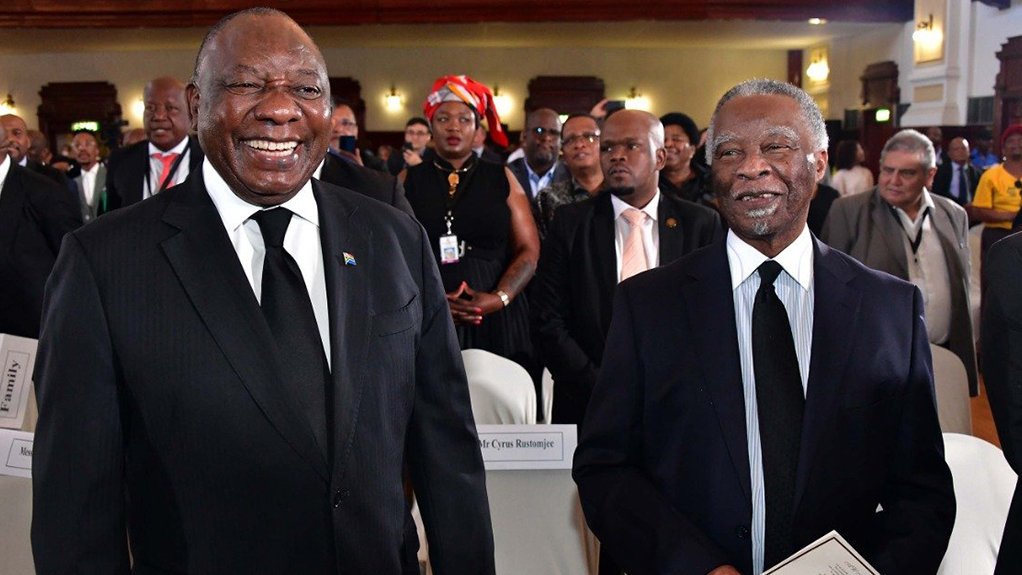Despite being the African National Congress's (ANC's) most prominent critic in recent years, former president Thabo Mbeki enjoys favourable popularity in the public and among ANC members, with a score surpassing President Cyril Ramaphosa.
Voter survey research by the political thinktank Social Research Foundation (SRF) ranked Mbeki as the most favoured political leader in the country.
Respondents were asked to indicate, on a scale of 0 to 100, in which light they viewed political leaders, with 0 being not favourable at all and 100 being very favourable.
Mbeki scored 57.5% in the survey conducted in October to gauge the political appetite for political leaders in the country. The survey measured the opinions of 1 412 people.
His score had increased from the 53% he received in a similar survey conducted in March by SRF.
The popularity survey also found that Mbeki ranked popular across racial groups.
Mbeki scored moderately among all race groups surveyed by the company, with black people responding with 60%, whites 45%, coloured 53%, and Indians 54%.
Mbeki's popularity in the ANC remains high, with party supporters scoring him 70%, Democratic Alliance (DA) supporters giving him 45% and Economic Freedom Fighters (EFF) supporters, 53%.
President Cyril Ramaphosa, in contrast, scored 44.4% favourability.
His score among racial groups was at 50% for black people, 18% for coloured, 39% for Indians and 29% for white people.
In political affiliation, Ramaphosa came in close to Mbeki's figures scoring slightly lower at 68% from ANC supporters, 27% from DA supporters and 33% from EFF supporters.
Professor Dirk Kotze from the University of South Africa (Unisa) told News24 that Mbeki's increased public appearances and outspoken nature were working in his favour in earning the public's admiration.
Mbeki left office in 2008 after being forced to resign as the country's first in command following the loss of the ANC presidency to Jacob Zuma in 2007.
His popularity then was low among ANC supporters and members.
Kotze said Mbeki's popularity was likely fuelled by South Africans' nostalgia for seemingly better years.
Kotze said the economy was performing better, and the dire service delivery concerns were not as stark.
"He [Mbeki] tries to take people to a time when he was president between the years of 1999 and 2008. It was a time when the economy did well, and the global economy did very well. There were yet to be all the governance problems and service delivery problems."
Kotze added that the government was not so associated with corruption as it is now, and the notion of state capture did not exist yet.
"It is a memory of relatively good times, and he tries to keep that alive while safeguarding his legacy. The problematic issues with his presidency he does not refer to at all. He does not refer to Zimbabwe and the problems with that country's former president, Robert Mugabe, and that his silent diplomacy did not improve conditions in Zimbabwe."
"He also does not talk about the issues around ARVs and people who died [of Aids] without access to medication. The positive aspects are the ones that are emphasised, and he does this regularly. He has his quarterly engagements at Unisa where he speaks about his legacy and highlights them," Kotze said.
In comparison, Kotze said Ramaphosa's lower favourability score resulted from more challenging economic conditions and increased corruption and service delivery progress.
"And that is the nice position that he [Mbeki] is in. He can talk about all of the issues plaguing the country, but he does not have to take responsibility. That is the big difference between him and President Cyril Ramaphosa. Ramaphosa is the one who must take responsibility for the current problems, and therefore, his popularity is lower," Kotze said.
Zuma scored 28,9% overall, with his popularity higher among black people at 32%, while coloured people scored him at 2%, Indians at 15%, and 0% from white people.
Zuma's score with ANC supporters stood at 35%, 13% from the DA, and 48% from EFF supporters.
Ramaphosa's deputy, Paul Mashatile, remains relatively less recognised among the broader electorate. He scored 13% overall - 16% with black people, 3% with coloureds, 15% with Indians and 1% with whites.
His score with ANC supporters was also relatively low at 21%, 5% with DA supporters and 12% with the EFF.
Helen Zille tops John Steenhuisen
The SRF survey also gauged other political leaders.
Former DA party leader Helen Zille remains a preferred political figure compared to current leader John Steenhuisen.
Zille scored 27.5% overall in favourability, 19% among black people, 49% from coloureds, 45% from Indians and 69% from whites.
Steenhuisen meanwhile scored 18.5% overall, 8% among black people, 48% with coloureds and 59% among whites.
Among DA supporters, Steenhuisen, who was elected for a second term this year, scored 47% among party supporters, 8% among ANC supporters and 2% among EFF supporters.
EFF leader Julius Malema scored 27% in the favourability score, with 32% among black people, 15% with coloureds, 15% with Indians and 5% with whites.
Malema is more popular among EFF supporters scoring 81%, while scoring 22% among ANC supporters and 21% with DA supporters.
Despite leading a relatively less-known political party, BOSA leader Mmusi Maimane appears to still carry some favour among DA supporters.
He scored 24% with the DA, 16% with the ANC and 14% with the EFF. His overall favourability ranked at 21.1%, with his highest score among white people at 44%, 28% Indians, 39% coloureds and 16% with black people.
ActionSA leader Herman Mashaba remains most popular among white people, scoring 33%, 17% with Indians, 10% with coloureds and 10% from black people.
His overall favourability score was 14%. DA supporters favour Mashaba more at 19%, 12% from the EFF, and 10% from the ANC.
EMAIL THIS ARTICLE SAVE THIS ARTICLE FEEDBACK
To subscribe email subscriptions@creamermedia.co.za or click here
To advertise email advertising@creamermedia.co.za or click here











